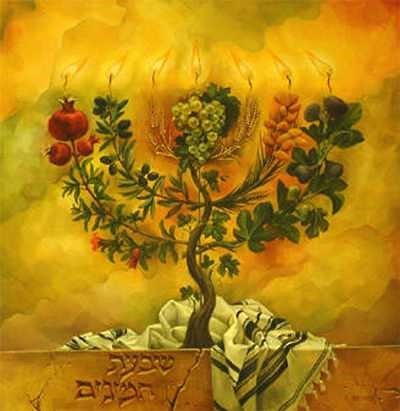The Month of Shevat
“…the eleventh month, the month of Shevat…(Zechariah 1:7)”
The month of Shevat is the eleventh month counting from Aviv. As it states in the Book of Zechariah, “On the twenty-fourth day of the eleventh month, the month of Shevat...” (Zechariah 1:7).
The word Shevat is Akkadian in origin meaning “a rod” and shares the same root as Shabbat or Sabbath.
The Zodiacal sign of Shevat is Aquarius, known in Hebrew as deli, meaning bucket because of the abundance of water that is present at this time, as the winter is still at its strength and the wells and rivers fill up. A bucket is a utensil used to bring water up from its source, and we find this imagery both in trees and in Torah. A tree is itself a type of a bucket, drawing the water from the ground through its roots, through its trunk, up to its most extreme branches, and out to its fruit so that we in turn may eat its meat and drink its nectar and be satisfied.
"The righteous eats to satisfy his soul but the stomach of the wicked is always lacking. (Proverbs 13:25)"
Likewise the one who explains Torah to his students at its deepest level can truly be said to be a "deli " - drawing the water of Torah from its source and serving it to those thirsting to drink from it. And so the waters of Shevat represent the sweet waters of Torah.
“Blessed are those who hunger and thirst for righteousness, for they will be filled. (Matthew 5:6)”
The root of deli means "to lift up." As Isaiah said, “Lift up your eyes and look to the heavens: Who created all these? He who brings out the starry host one by one and calls them each by name. Because of his great power and mighty strength, not one of them is missing. Why do you say, O Jacob, and complain, O Israel, ‘My way is hidden from Yahweh; my cause is disregarded by my Elohim?’ Do you not know? Have you not heard? Yahweh is the everlasting Elohim, the Creator of the ends of the earth. He will not grow tired or weary, and his understanding no one can fathom. (Isaiah 40:26-28)”
Torah is likened to water, and for forty years the waters of Torah were flowing amongst the Children of Israel in the desert. When this era was coming to a close, what was there left for Moses to do? The only thing he could do was to explain and make real that which he had already taught. Drawing and providing water from the River of Life for the people to drink.
This is particularly appropriate for Moses, whose very name comes from the fact that he himself was drawn from the water.
Mo-sheh' = drawn from the root word maw-shaw' meaning to draw as from water.
Shevat always has 30 days, and Tu bi-Shevat (New Year for Trees) falls, following the tradition of the school of Hillel, on the 15th of Shevat.
“And Elohim said: "Behold, I have given you every herb yielding seed which is upon the face of all the earth, and every tree that has seed-yielding fruit — to you it shall be for food." (Genesis 1:29)”
Tu B’Shevat - the 15th of Shevat
The 15th day of the 11th month alludes to the secret of the Sacred Name, Yahweh, whose first two letters, yod and hey (which represent the Heavenlies) equal 15, and whose last two letters, vauv and hey (represent the earthly), equal 11. The full secret of the Name Yahweh is the secret of the "Tree of Life," the tree of the month of Shevat.
“Moses explains righteousness that is grounded in the Torah: ‘The man who does these things will live by them. (Leviticus 18:5)’ Moreover, the righteousness grounded in faith says: ‘Do not say in your heart, “Who will ascend into heaven?”’ (that is, to bring Messiah down) or “Who will descend into the deep?” (that is, to bring Messiah up from the dead). But what does it say? ‘The word is near you; it is in your mouth and in your heart, (Deuteronomy 30:12-14)’ that is, the word of faith we are proclaiming: That if you pledge allegiance with your mouth, "YahShua is Sovereign," and believe in your heart that Yahweh raised him from the dead, you will be saved. For it is with your heart that you believe and are justified, and it is with your mouth that you confess and are saved. As the Scripture says, ‘Anyone who trusts in him will never be put to shame. (Isaiah 28:16)’ For there is no difference between Jew and Gentile—the same King is Sovereign of all and richly blesses all who call on him, for, ‘Everyone who calls on the name of Yahweh will be saved.’ (Joel 2:32)” (Romans 10:5-14)
Shevat is the time that the rain waters of the winter months begin to ascend in the veins of the tree and bring it new life. We look to Shevat as a blessing month whose rains will lead us to the new growth of Spring.
The New Year of Trees is the 15th of Shevat (Tu B’Shevat).
Scriptural Significance of Shevat
Moses gathered the people together on the first day of Shevat and told them : 'Behold, my time to die is coming, therefore anyone who has heard anything from me and forgotten it should come now and I will clarify it; anyone who has any doubts should come now and I will explain.' This was a crucial period in the life of the Torah - the last chance to learn it from its greatest teacher.
So, on the first day of Shevat, Moses, moved by the Spirit of Yahweh, began to recite the words of the Book of Deuteronomy to Israel. "In the fortieth year, on the first day of the eleventh month, Moses proclaimed to the Israelites all that Yahweh had commanded him concerning them." (Deuteronomy 1:3). He reviewed many of the Laws that had been taught at Horeb and at the "Ohel Moed," the "Tent of Meeting," the gathering place of the Children of Israel around the Mishkan, where they had come to learn Torah from Moses. The Book of Deuteronomy is called "Mishna Torah," "Review of Torah," for this reason. “This was after he had defeated Sihon king of the Amorites, who reigned in Heshbon, and at Edrei had defeated Og king of Bashan, who reigned in Ashtaroth. (Deuteronomy 1:4)”
Moses rebuked the Children of Israel there for all their rebellions against Yahweh during the forty-year period in the desert.
“…you rebelled against the command of Yahweh your Elohim. You grumbled in your tents and said, ‘Yahweh hates us; so he brought us out of Egypt to deliver us into the hands of the Amorites to destroy us. Where can we go? Our brothers have made us lose heart. They say, “The people are stronger and taller than we are; the cities are large, with walls up to the sky. We even saw the Anakites there.”’
Then I said to you, ‘Do not be terrified; do not be afraid of them. Yahweh your Elohim, who is going before you, will fight for you… (Deuteronomy 1:26-29)”
He told them of the great reward they would receive if they faithfully observed the Torah, and the terrible punishments they would suffer if they did not
On the plains of Moab, Yahweh gave to Moses another Covenant – a New Covenant – that prophesied how Israel would desert the First Covenant made at Horeb but more importantly spelled out the Law of Return. (Deuteronomy 29:1, 9-29; 30:1-10)” This is the first mention of the New Covenant.
He prepared them for their entry into, conquest and possession of the land of Israel. He concluded by blessing them, before his death, with some of the most inspiring language in all of the Sacred Scriptures.
For thirty-seven days, Moshe spoke these words to all Israel. He began the first of Shevat and ended the seventh of Adar. His first words were:
"Yahweh our Elohim said to us at Horeb, ‘You have stayed long enough at this mountain. Break camp and advance into the hill country of the Amorites; go to all the neighboring peoples in the Arabah, in the mountains, in the western foothills, in the Negev and along the coast, to the land of the Canaanites and to Lebanon, as far as the great river, the Euphrates. See, I have given you this land. Go in and take possession of the land that Yahweh swore he would give to your fathers—to Abraham, Isaac and Jacob—and to their descendants after them." (Deuteronomy 1:6-8)
His concluding words were: "There is none like Elohim, O Jeshurun; He rides across heaven to help you, and in His majesty through the upper heights. That is the abode of Elohim immemorial, and below are the world's mighty ones; He drove the enemy away from before you, and he said, 'Destroy!' Thus Israel shall dwell secure, solitary, in the likeness of Jacob, in a land of grain and wine; even his heavens shall drip with dew."
"Fortunate are you, O Israel: Who is like you! O People delivered by Yahweh, the Shield of your help, Who is the Sword of your grandeur; your foes will try to deceive you, but you will trample their haughty ones." (Deuteronomy 33:26-29).
Thus the first of Shevat is comparable to the day of the giving of the Torah. Just as Shavuot in the month of Sivan, when the Torah was given to Israel, remains forever a time to renew in our hearts and minds acceptance of the Torah, so is the heart of the true covenant-keeping Israelite newly receptive to the Torah on the first of Shevat, because on that day they began to receive the Book of Deuteronomy, the explanation of the Torah to include the New Covenant of Deuteronomy 29, 30 from Yahweh, through the faithful mouth of Moses..
Because the period of transmission of the Book of Deuteronomy was this thirty-seven day interval, all the days from the first of Shevat until the seventh of Adar are especially well suited for renewing your commitment for studying of Torah and acting it out in your life.
“Study to show yourself approved by Yahweh, a workman needs not to be ashamed, rightly dividing the Word of Truth. (2 Timothy 2:15)”
Shevat emerges as a month characterized by the spreading of Torah throughout the whole Commonwealth of Israel.
Used with Kind permission from Rabbi Rob Miller


